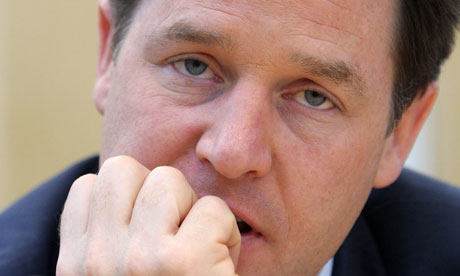The Deputy Prime Minister, Nick Clegg, faced a torrid time at PMQs yesterday as question (or should I say attack?) after question centred on tuition fees and higher education.
This is intensely difficult for all Liberal Democrat MPs, not least their leader, and the strain showed in his face. His voice was hoarse with frustration and emotion as the half-hour trial neared its end.
That Labour introduced tuition fees against their own manifesto promise is something that the Government needs to remind people of, and Clegg mentioned this yesterday. The Labour Party manifesto in 2001 contained the following promise:
"We will not introduce 'top-up' fees and have legislated to prevent them."
This is a point worth reiterating, yet only so far. It was a long time ago now (most of the students protesting yesterday were still at primary school when that promise was made) and it does not make those photos of smiling Lib-Dem MPs holding NUS pledge placards disappear. There needs to be a better argument made about why the Government's plans for higher education are economically necessary and - I'm going to use two words I can't stand, sorry - fair and progressive.
The Government needs to be incorporating HE policy within its wider education programme, something I wrote about when Lord Browne published his review last month and again following David Willetts' statement to the House of Commons on 2nd November. The universities and skills minister did make the point that the HE reforms sit alongside other education reforms, such as the pupil premium and free schools. Higher standards of assessment should also be added to that list. But little has been heard of this line of argument since. One senior source on the Liberal Democrat benches tells me that the Government needs to put this point across, as better schooling is vital to widening access to higher education.
Martin Horwood - as courageous as he was being the only Lib Dem MP to come out and face the music yesterday afternoon - didn't help the cause by responding to a bolshy student, "do you think the fairies are going to pay for your education?"
The argument that binmen and bricklayers shouldn't be paying their taxes to subsidise the education of university students has run its course. The considerable value of a highly educated, graduate population is now self-evident, not least in that the UK's economic future lies in expert service industries and high technology. Moreover, it is estimated that the UK's higher education's economic impact is in excess of £45 billion and the sector supports over 600,000 jobs.
So the Government must make the this argument and it must make it frequently: education is not a zero-sum game and universities are not an isolated part of the education system. Reforms to higher education do not, on the face of it, appear to be good news but there is plenty of excellent material lying behind the fees increase, such as support for part-time students and reduced repayment costs for many as a result of the increased threshold. There are many other positive reforms taking place in education as a whole, and the necessary reforms to higher education must be considered as one part of that longer, formative stage in young people's lives.


















No comments:
Post a Comment